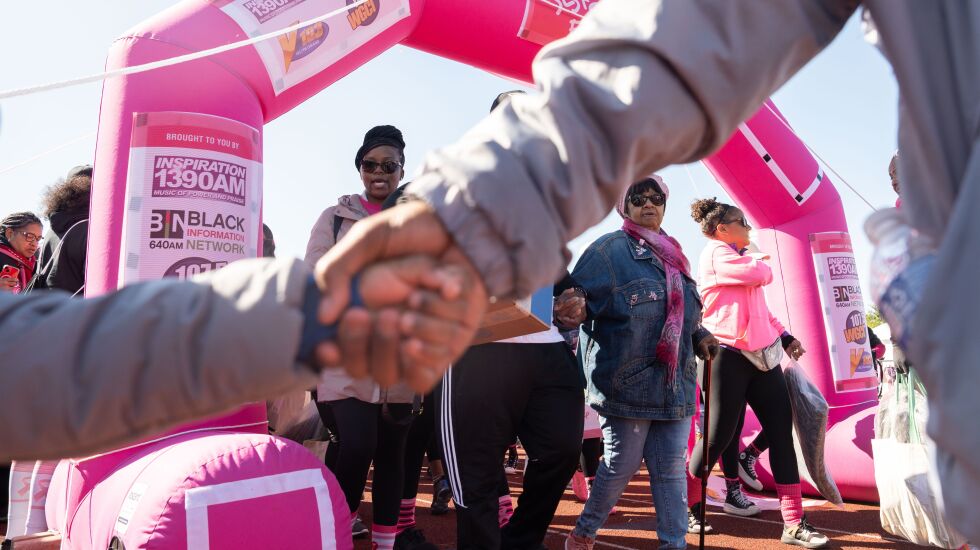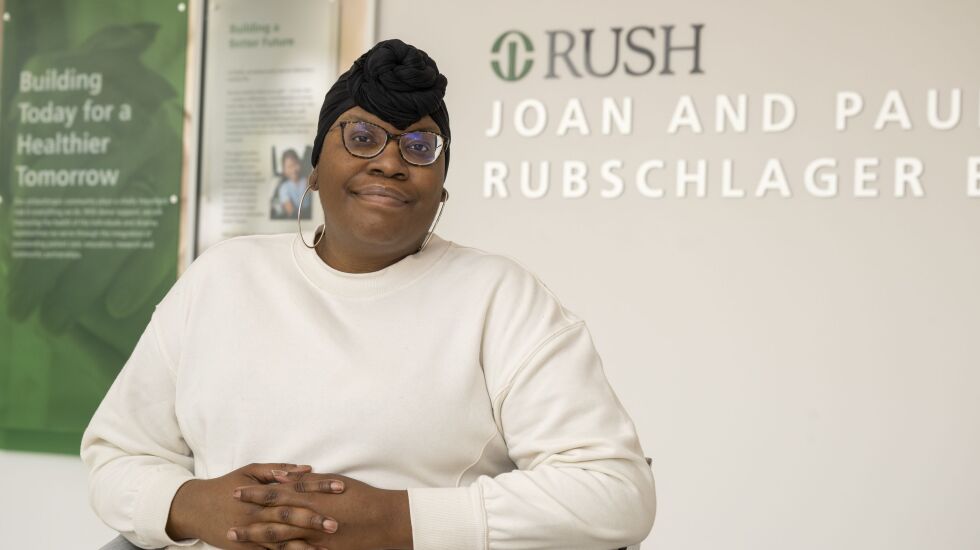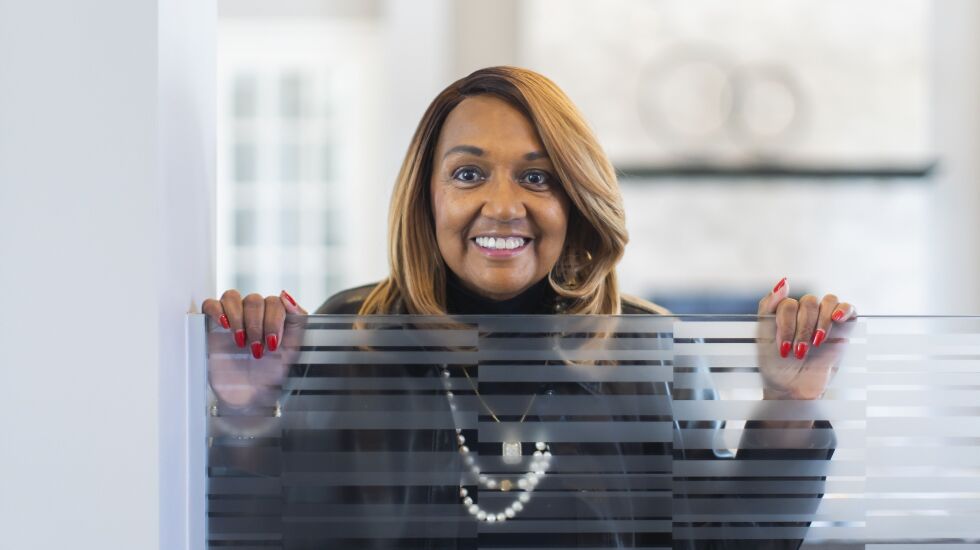
Alexandria Abraham found a lump in her breast two years ago, when she was 25. She was referred to specialists to get a biopsy but didn’t go because she didn’t have good health insurance.
As the lump grew and her symptoms multiplied, she resigned herself to believing she likely had breast cancer.
“I was very stoic,” Abraham said. “It didn’t really hit me yet. I was just worried.”
When she got a new job with better insurance — a year later — she got a biopsy.
Her mid-20s diagnosis of breast cancer is rare — only 5% of women are diagnosed with breast cancer in their 20s.
“I like to go out every weekend,” Abraham said. “I just like to do stuff. I’m adventurous. Cancer has taken that away from me.”

Women of color — especially Black women — haven’t benefited equally from advancements in breast cancer treatment, according to a 2022 report from the American Cancer Society. It found that Black women have a 40% higher mortality rate nationally than white women for breast cancer despite a higher incidence of the disease among white women.
Experts say reasons for that include Black and Brown women having less access to quality health care, aggressive types of cancers being more often found in women of color and Black and Brown women getting diagnosed later in the progression of the disease.
But support offered to women of color through the Lurie Cancer Center Hispanic Breast Cancer Clinic, and groups including Sisters Working It Out, provide community, health care access and hope for Black and Brown survivors.
Dr. Claudia Tellez, a Chicago oncologist, said Black women advocating for themselves led her to spearhead the Hispanic Breast Cancer Clinic at Northwestern Memorial Hospital. The clinic, which opened in September, provides care in Spanish and aims to lessen disparities in breast cancer care for the Hispanic population.
While Hispanic patients in Illinois have mortality rates lower than Black and white patients, Tellez said most Hispanic breast cancer patients haven’t received care from top-tier major medical centers. Instead, she said, they often seek care in their communities.
It can be intimidating to go to a big medical facility, especially if you aren’t comfortable speaking English or are worried about not understanding your doctors, Tellez said.
Major hospitals have doctors who specialize in treating breast cancer, but community-based care centers might not offer the same array of treatments, Tellez said.
“It’s particularly concerning that the type of care our women are getting in the community is suboptimal,” she said. “They’re not receiving the best treatments for all the stages. But they’re also not being able to participate in clinical trials.”
Tellez said patients of all ethnic backgrounds should get a second opinion from a cutting- edge medical center even if they choose to get treated in the community.
Black women — particularly young Black women — are much more likely to develop aggressive forms of breast cancer such as triple-negative breast cancer and inflammatory breast cancer. Tellez said these patients could benefit from advanced medical treatment, like the clinical trials that top-tier medical centers offer.
Some mistakenly believe that care at top hospitals is more expensive, Tellez said. But a patient with insurance paying a co-pay will likely still pay the same amount as at any other facility, she said. And people who are undocumented or uninsured often can get breast cancer care for free from Northwestern, she said.
Last weekend, when Erika Aleman ran in the Chicago Marathon, she crossed the finish line with a time of three hours and 44 minutes — her personal best. Aleman, 44, has run 14 marathons, but this was her first since being in remission for breast cancer.
A native of Mexico, she was diagnosed in March 2021 after pushing her clinic to give her a referral for a mammogram. She’d felt a lump after losing 20 pounds while training in hopes of qualifying for the Boston Marathon.
“At the beginning, the doctor who saw me at the time told me that, according to her experience, [the lump] didn’t feel like cancer,” Aleman said.
The mother of two said she didn’t have health insurance but decided she’d pay out of pocket for the appointment, which was scheduled for three months later at Northwestern.
She was terrified. Stories of friends who died from breast cancer flashed through her mind.
“When I went to the hospital, I was just waiting for them to tell me that it was going to be my last day,” Aleman said.
Being her own advocate paid off even though she didn’t make it to Boston. Instead, she went through chemotherapy and had a double mastectomy just days after running last year’s Chicago Marathon.
Her doctors and nurses — who now work with the Lurie Cancer Center Hispanic Breast Cancer Clinic — were supportive and encouraged her to continue running.
The new clinic focusing on Spanish-speakers is needed, she said.
“I do speak English, but sometimes it’s really hard to understand those big medical words,” Aleman said. “Having someone to speak the same language, it really helps calm anxiety or any worries that we have.”
Like Aleman, Abraham, who’s been treated at Rush University Medical Center, said she feels lucky to have gotten great care.
Initially, she said, she tried to keep going to work amid her chemotherapy appointments, but she later realized she needed to take a leave of absence.
Two years after first noticing the lump, Abraham finished chemotherapy and had a mastectomy. She now has a drain attached to her abdomen, a remnant of the surgery. She’s awaiting the news about whether the cancer is still there. If so, radiation might be the next step.
Abraham said, she was returning from a psychiatry appointment her doctors set up. The invasive treatments have taken a toll on her mental health.
Through her support system at Rush, she got involved in the Sisters Working It Out organization, which is dedicated to educating and supporting Black women and health issues.
“I really want to advocate for younger women to start paying attention to any changes in their breasts,” she said.
Nationally, events like the Sista Strut Breast Cancer Walk raise awareness about breast cancer’s prevalence among women of color. At the walk in Chicago earlier this month, women sporting shades of pink bonded, some wearing sashes with “survivor” emblazoned on them. Others held photos of loved ones. The event helped raise money for the Chicago chapter of the Sisters Network, a breast cancer survivor support group for Black women.
Experts advise women to get a yearly mammogram starting at 40. Even before that, women should do daily breast self-exams, said Beulah Brent, chief executive officer of Sisters Working It Out.
Brent said she’s heard countless stories of doctors telling women to “wait and see” before doing more comprehensive tests after a troubling mammogram. By the time one woman got to a doctor that took her seriously, Brent said, the patient was already at Stage 3..
“I think the most important thing is how do we bridge this gap? I know educating women of color is the key,” Brent said. “But I think one of the other things that’s so important is educating our providers.”
Through Brent’s organization, patients can get free Uber rides to and from their appointments and free meals.
“You need to get just as familiar with your breasts as you are with your face,” she said.
Leslie Rienzie-Barry, 68, said she had never missed a mammogram. But, in November 2019, the weather was unusually beautiful, she said, and she wanted to enjoy it. So she skipped her appointment.
The Naperville resident got in for her rescheduled screening in February 2020. She assumed the doctors were kidding when she was referred to an oncologist and then diagnosed her with breast cancer.
“Jokingly, I said, ‘Am I being punished now because I didn’t come when I was supposed to?’” Rienzie-Barry said.
She doesn’t know whether keeping her appointment in November would have caught her cancer sooner.

“When I think about my story ... I want to say remember to go to checkups,” she said. “And keep that appointment.”
Two years after that missed mammogram — and after chemotherapy and surgery — Rienzie-Barry got her “certificate” of remission.
But she said it’s “never really over.” Continued checkups are necessary, even after being deemed cancer-free.
“I think sometimes we think, with cancer, is that once it’s over, it’s over,” she said. “But it’s never really over.”







